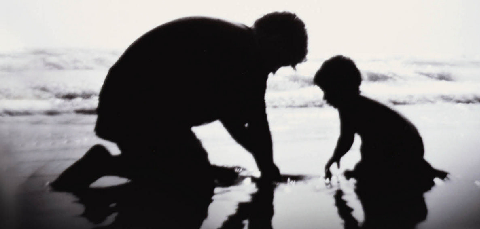
By Hanne Watkins.
Alex sat clutching his favourite spoon, which had a rocket printed on its chubby handle and small side fins to complete the effect. We were soon having great fun as I guided the cereal into his mouth with the kind of zooming noises fathers are convinced will encourage good coordination.
It was then I noticed that when he blinked, his eyelids moved slightly out of kilter.
When I read these lines, a shiver ran down my spine. Of course, when I started reading When Horse Became Saw, I had a fair idea of what I was getting myself into. Written by Anthony Macris, it is the story of “a family’s journey through autism”. When Horse Became Saw describes the many ups and downs experienced by Anthony, his partner Kathy, and their son Alex, from the time Alex developed autism at 18 months, up until the publication of the book. In other words, I knew it wouldn’t be an “easy read”. Nonetheless, for the first few chapters as Anthony describes his son’s first year of development, I found myself drawn into the story to the extent that when the first “tiny cracks” of autism appear, I felt their pain and confusion acutely.
… “big questions” that surprised me were the question of what it means to be “neurotypical”, and the extent to which treatment of autism “enforces” a particular way of thinking.
Anthony’s prose is articulate and lucid, describing both great beauty and great despair without slipping into sentimentalism. Since he’s writing about a topic so close to his heart I imagine we easily could have ended up with a somewhat insular tale, a kind of navel-gazing family history. And while a story of simply “a family’s journey through autism” would no doubt be interesting enough in itself, I was pleasantly surprised about the extent to which Anthony sees the bigger picture. This ability to position his family’s journey in the context of society as a whole is evident right from the start, when Alex has not yet developed autism and his parents are planning for his future by setting up a scholarship fund. Here, the discussion of “private versus public” is foreshadowed; it’s a discussion point that is raised again and again throughout the book as Anthony and Kathy battle to provide the best care for their son.
Other “big questions” that surprised me were the question of what it means to be “neurotypical”, and the extent to which treatment of autism “enforces” a particular way of thinking. How do we, as a society, treat not only those that are more vulnerable, but also those that are less “normal”? Anthony reflects on behaviourism as a treatment, and the process of his own and Kathy’s grieving. He gives a great overview of the incredible amount of research on autism, without getting too stuck on the ever-elusive details, which is very helpful to readers (like me) who do not have much exposure to autism. Finally, in a scene towards the end of the book when he is returning to teaching, he talks to his students about the “use” of writing and literature. I am particularly looking forward to hearing everyone thoughts on this latter point, at the Read & Rights book club next month.

